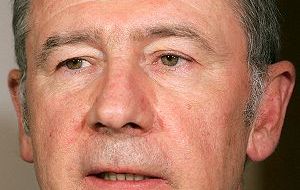MercoPress. South Atlantic News Agency
Controversy surrounds election of next IMF managing director
 Spaniard Rato has resigned as IMF managing director, effective in October
Spaniard Rato has resigned as IMF managing director, effective in October The race to fill the post of Managing Director of the International Monetary Fund, IMF, completes a decisive leg this Friday when the period to register candidacies comes to a close at midnight.
So far two are the candidates to replace Mr Rodrigo Rato who has resigned for personal reasons, France's former Economy minister Dominique Strauss-Khan and the former president of the Czech Central Bank Josef Tosovsky. Strauss-Khan is currently in a South American tour lobbying in Argentina, Bolivia, Brazil and Chile among other countries. Until last week Strauss-Khan was the only candidate, presented by French president Nicolas Sarkozy with an initial support from the European Union. However August 22nd Russia announced the candidacy of Tosovsky. Although the IMF has promised an open and transparent nomination process, there's a non written rule dating back to the conception of the IMF and World Bank in1944 which split responsibilities between a European and a US citizen respectively. Russia thus has become the spokesperson for the majority of the 185 country members, particularly emerging economies that would like to see the "rule" changed. "Since the election process is so committed, it can easily be forecasted that the non written rule will prevail and thus the EU candidate", said Russian Finance minister Alexei Kudrin, adding "it's unfair even for influential countries of the G 8. The election should be entirely professional including possible candidates from emerging economies such as Brazil, India and China". The controversy was further fueled by The Financial Times which said Mr. Strauss-Khan "is the wrong candidate, chosen in the wrong way". Some of the arguments from the FT follow: "Mr Mozhin was right when he said "the IMF is facing a severe crisis of legitimacy". He was correct to insist that "we must select the best candidate" if the institution is to remain relevant to developing countries. He was right to note that Mr Strauss-Kahn's biography does not show that "he has the necessary technical skills to do the job", adds the prestigious financial daily. Since the world's foreign currency reserves will shortly be 20 times the resources of the Fund, the days when it could dictate to important countries are past. Its only assets are political legitimacy and intellectual authority. On these rest the credibility of its surveillance, the cogency of its advice and its effectiveness as an honest broker. The Fund, then, needs an intellectually credible head. But nobody could argue that Mr Strauss-Kahn is the best-qualified candidate in the world by his experience, intellect or training. His insistence that bridging the gap between rich and poor would be one of his priorities shows this. Macroeconomic stability is the Fund's job. He seems to be running for president of the World Bank, a job taken, again, by a US candidate. Yet even if Mr Strauss-Kahn were the ideal candidate, the method of his selection would undermine his presidency. Emerging countries no longer understand why Europeans should determine who might dictate to them in any crisis, as if their old empires still existed. The IMF is either a global institution with a head chosen by the world, or it is an expression of Europe's will to cling on to every scrap of its prestige and power. In this latter guise, the Fund will be shorn of all -legitimacy. Worst of all, no genuine European interest is served by forcing on the Fund a man who is neither qualified nor legitimate. Europe's insistence on the old carve-up of the Fund and the World Bank with the US is as arrogant as it is foolish. The only interests served are those of politicians determined to preserve a time-worn droit de seigneur.The developing countries should vote against this nomination, on principle. The developed countries may still push it though. But they will have secured a Pyrrhic victory.




Top Comments
Disclaimer & comment rulesCommenting for this story is now closed.
If you have a Facebook account, become a fan and comment on our Facebook Page!